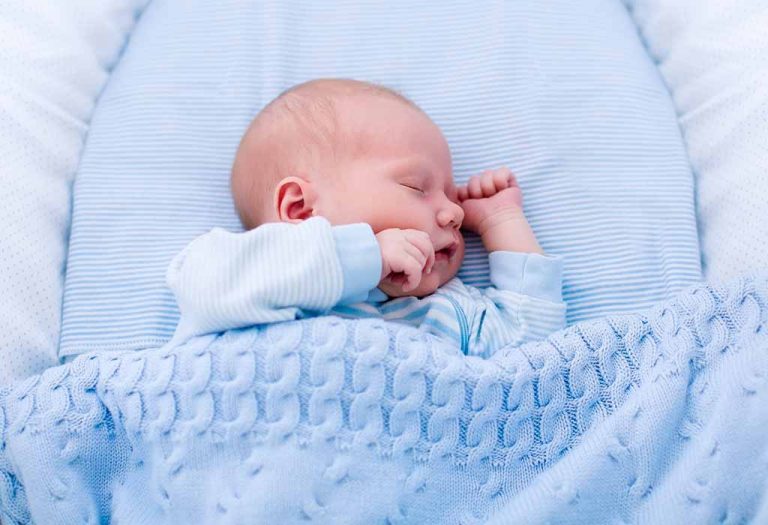11 Month Old Sleep Schedule – Sample, Bedtime and Nap Schedule
Setting up a sleep routine for your 11-month-old baby can be crucial to their growth and overall health. As they continue to grow and develop, changes in their sleep patterns can become apparent, making it essential for you, as a parent, to adapt and respond effectively. This guide will provide a sample bedtime and nap schedule tailored for 11-month-old babies. The information shared here will help you understand your baby’s evolving sleep needs and provide the tools necessary to foster a harmonious sleep environment. This will promote healthier sleep habits for your little one, contributing to their happiness and peace of mind.
How Much Sleep Should an 11-Month-Old Need?
An 11-month-old typically needs around 12 to 16 hours of sleep in 24 hours. This includes nighttime sleep, which usually lasts 10 to 12 hours, and daytime naps, which typically consist of two naps lasting between 1 and 2 hours each (1). Sleep needs can vary from one child to another. Monitoring your baby’s sleep patterns and adjusting their schedule is essential. Ensuring your child gets enough sleep is necessary for their growth and development.
Sample Sleep Schedule for an 11-Month-Old Baby
Establishing a regular sleep routine is advantageous for both infants and parents. Here’s a sample 11-month sleep schedule to guide you:
| Time | Activity to Do |
| 7:00 AM | Wake up and breakfast |
| 9:30 AM to 10:30 AM | Morning nap |
| 12:30 PM | Lunch |
| 2:30 PM to 3:30 PM | Afternoon nap |
| 6:00 PM | Dinner |
| 7:00 PM | Start bedtime routine |
| 7:30 PM | Asleep for the night |
11-Month Old Nap Schedule
At 11 months, babies often take two naps a day — one in the morning and one in the afternoon. These naps can offer a beneficial rest period for your baby and for you as a parent.
Here’s a typical nap schedule for an 11-month-old baby. Remember, the exact times might vary based on your baby’s unique sleep needs and your family’s daily routine.
| Naps | Timing |
| Morning Nap | 9:30 AM to 10:30 AM |
| Afternoon Nap | 2:30 PM to 3:30 PM |
While following this nap schedule, ensure your baby is not napping too close to bedtime, as it might make it harder for them to fall asleep at night. Regularity in nap timing can also aid in maintaining a steady night-time sleep schedule for your 11-month-old baby.
Is It Possible to Sleep Train an 11-Month-Old Baby?
Yes, it is possible, and often very successful, to sleep-train an 11-month-old baby. Sleep training can be a beneficial way of helping your baby develop good sleep habits and become a self-sufficient sleeper. Here’s what you need to know about sleep training at this age.
At 11 months old, your baby is cognitively developed enough to understand different sleep associations and routines. They’ve begun to grasp the concept of object permanence, recognising that you still exist even when you’re not visible and can start to self-soothe with the help of comfort objects like a favourite blanket or soft toy.
There are several sleep training methods, and finding a technique that aligns with your parenting style and comfort level is crucial. Some popular options include the Ferber method, where you gradually increase the time between visits to your baby’s crib when they’re crying (3). The chair method involves sitting in a chair beside your baby’s crib until they fall asleep and gradually shifting the chair further away each night (2).
While sleep training, remember that consistency is critical. Before starting, ensure your baby is well-fed, comfortable, and in a sleep-conducive environment. Most importantly, know that every baby is different, and what works for one might not work for another. Sleep training is a process that may take time for your baby to adjust. It’s essential to stay patient and seek advice from a paediatrician or a sleep consultant if you have concerns or sleep training methods are unsuccessful.
Does a Baby Have Sleep Regression at 11 Months?
Yes, an 11-month-old baby might experience sleep regression. Sleep regression happens when a baby sleeping well begins waking up frequently at night, struggles to fall asleep, or has shorter naps.
Sleep regression at 11 months can be linked to various developmental milestones. Your baby is likely becoming more mobile, is starting to walk, and is experiencing a surge in brain development. These significant growth periods can disrupt sleep as your baby’s mind and body work through these changes.
Teething can also contribute during this period, causing discomfort that interrupts sleep. Additionally, an 11-month-old might be more aware of their separation from their parents, leading to increased anxiety at bedtime.
Fortunately, sleep regression is usually a temporary phase. Providing a consistent sleep environment, maintaining regular routines, and offering comfort can help your child through this challenging time. If the sleep regression persists and becomes a concern, seeking guidance from healthcare professionals may be advisable, as they can provide tailored advice and rule out any underlying health issues.
What Are Some Common 11-Month-Old Baby Sleep Problems?
Sleep problems can be common among 11-month-old babies. Let’s look at the five common ones:
1. Night Waking
Babies may start waking up during the night more frequently, often due to separation anxiety or sleep regression.
2. Refusal to Nap
Some babies may resist their daytime naps, resulting from overstimulation or under-tiredness.
3. Sleep Regression
As mentioned earlier, some babies experience sleep regression around this age.
4. Separation Anxiety
As infants become more conscious of their environment, they may feel anxious when away from their parents, impacting their sleep.
5. Transition From Two Naps to One
This transition can be tricky and may disrupt the sleep schedule for an 11-month-old.
How to Help Your 11-Month-Old Baby to Sleep?
Helping your 11-month-old get a good night’s sleep involves consistency and patience. Here are seven tips:
1. Establish a bedtime routine: This can include a bath, storytime, and a lullaby before bed.
2. Create a sleep-friendly environment: Keep the room dark, quiet, and calm (4).
3. Ensure the baby is well-fed: A full stomach can help the baby sleep better.
4. Limit stimulation before bed: Avoid active play and screen time (5).
5. Use a security object: A favourite blanket or toy can provide comfort.
6. Respond to night waking calmly and consistently: Reassure them without turning on lights or taking them out of bed.
7. Follow a consistent sleep schedule: Regular wake times, nap times, and bedtimes can help regulate their sleep cycle.
When to Call a Doctor?
If your baby is experiencing ongoing sleep issues, appears overly tired, or changes their sleep schedule suddenly or drastically, contacting your paediatrician might be a good idea.
FAQs
1. Why is my 11-month-old baby waking up at night?
Night waking can be due to various factors, including sleep regression, hunger, teething, or separation anxiety.
2. How to choose the best bedtime for your 11-month-old baby?
The best bedtime for an 11-month-old baby typically falls between 7 to 8 PM. This should allow them enough sleep before their early morning wake-up time.
1. Observe your baby’s energy levels and mood throughout the day to identify their natural sleepiness.
2. Establish a consistent bedtime routine that signals time to wind down and prepare for sleep.
3. Aim for a bedtime that enables your baby to sleep 11-12 hours each night, adjusting according to their needs.
4. Be attentive and responsive to your baby’s signals, modifying their bedtime to ensure they are well-rested and happy.
Remember, your baby’s sleep schedule may not look exactly like this sample 11-month-old sleep schedule, and that’s okay. Every baby is different. However, these guidelines provide a framework to understand what is ideal for your child.
References/Resources:
1. Sleep and Your 8- to 12-Month-Old; Nemours KidsHealth; https://kidshealth.org/en/parents/sleep812m.html#:~:text=Most%20babies%20this%20age%20should,for%20up%20to%202%20hours.
2. Bannister. I; Chair Method Sleep Training: A Guide for Sleepy Parents; WonderBaby.org; https://www.wonderbaby.org/articles/chair-method-sleep-training; July 2022
3. Summer. J; The Ferber Method for Sleep Training; SleepFoundation.org; https://www.sleepfoundation.org/baby-sleep/ferber-method
4. Carpenter. J; Baby Sleep Regressions: How to Cope Through Each Stage; Sleep Advisor; https://www.sleepadvisor.org/sleep-regression/
5. Infant Sleep; STANFORD MEDICINE CHILDREN’S HEALTH; https://www.stanfordchildrens.org/en/topic/default?id=infant-sleep-90-P02237
Also Read:
11 Months Old Baby Milestones
Your 11-Month-Old Baby’s Growth and Development
11 Month Old Baby Feeding Schedule, Recipes And Tips
Was This Article Helpful?
Parenting is a huge responsibility, for you as a caregiver, but also for us as a parenting content platform. We understand that and take our responsibility of creating credible content seriously. FirstCry Parenting articles are written and published only after extensive research using factually sound references to deliver quality content that is accurate, validated by experts, and completely reliable. To understand how we go about creating content that is credible, read our editorial policy here.





















.svg)


















